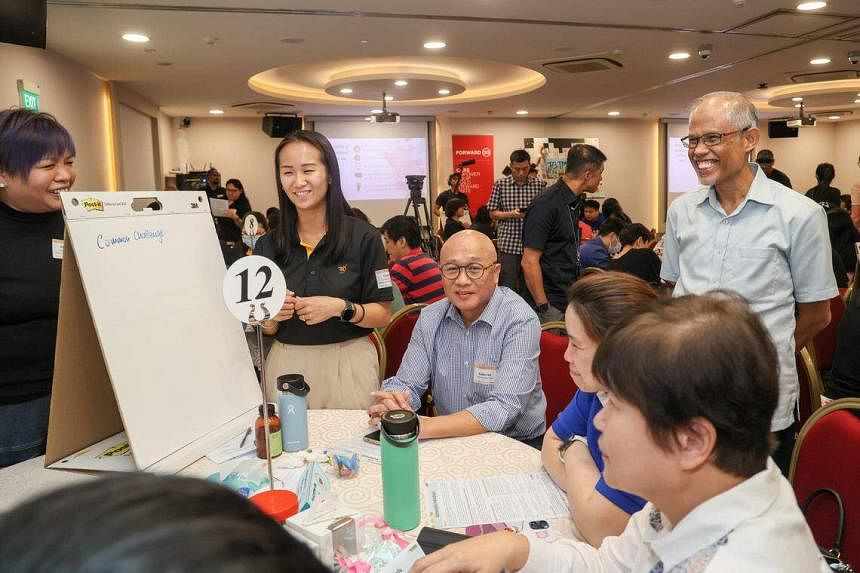SINGAPORE - Singaporeans are more willing to help the less fortunate if they try to help themselves, a recent study by the Ministry of Social and Family Development (MSF) has shown. When people take charge of their lives and work to improve their own circumstances, then the rest of society, corporates and government will give them a helping hand.
Mr Masagos Zulkifli, Minister for Social and Family Development, made this point at an SG Cares Community Network session held at Civil Service Club @ Tessensohn on Monday. The session was held as part of MSF’s Forward SG engagements with Singaporeans.
He said that while trying to help lower-income families, it was important to remember that these are individuals with agency who find dignity in providing for themselves and their children.
“Singaporeans want to work hard to do well for themselves, their families and their communities. And we must never take this away,” he said.
Several participants at the session agreed as they engaged in group discussions where they exchanged ideas on social mobility and self-reliance of families who live in public rental housing.
They stressed, for example, that different agencies should involve lower-income families in making decisions for themselves, rather than telling them what to do.
Some participants even suggested roping in informal networks such as neighbours to advise such families.
But the idea of people taking personal responsibility to improve their lot ran through the discussions.
Mr Masagos cited the case of a family living in a one-room public housing rental flat, where the father earned about $400 a month as a freelancer and the mother was a full-time caregiver to their two-year-old daughter. ComLink officers linked them to ComCare to address their immediate financial needs. The parents also took their advice to enrol their daughter in KidStart programmes, and the father managed to find a full-time job. The family aims to own its home one day.
“Like all families, many of these families find dignity in providing for themselves and for their children. We all know the feeling of achieving something, especially with our own efforts... Therefore as a society, we must enable families, and do so in a manner that respects their personal agency. We must reinforce personal efforts even as we work as a society to better support families.”
He cited ComLink as an example of how this was being put into practice. Under the programme, families with children living in rental flats map out their aspirations and develop action plans together with ComLink officers. They then work towards the goals they set, supported by volunteers and community partners.
The discussions, attended by more than 120 representatives of community agencies, volunteer groups, healthcare organisations, schools and government bodies, were held under the Chatham House Rule, under which participants are not named.
However, one participant, Ms Bavani Pillai, centre head of Kampong Kapor Family Service Centre, agreed to be named in media interviews and noted that it can be disempowering for a family when different agencies tell it what to do.
“I think we also need to be able to talk about what works for the family, by allowing the families to drive these conversations, because we’re asking them what their hopes and dreams are.”

She also suggested empowering ComLink families with volunteering opportunities to help those in their community. “They may not have money, but they may have certain expertise that will help other families navigate systems. No one is in a better position to help others in the same situation.”
Another participant, Mr Abdul Mateen, assistant director of programme delivery at KidStart, who also agreed to be named, told the media: “We come in with a great desire to help families, but I think sometimes it’s also important to meet families where they are and to understand the strengths that these families have and what they bring to the table, before we then decide ‘how do I journey with you?’”

Another participant suggested that those living in public rental blocks may feel better when neighbours and friends give them advice, rather than being told what to do by agencies.
Apart from agencies and volunteers helping such families, Mr Masagos also stressed the role companies can play. “When businesses offer an employment opportunity to an individual in need, it can set the family on a new trajectory.”
He said businesses can be more deliberate about designing suitable work arrangements and developing opportunities for their workers to upskill. The Government will continue to give workers a boost with initiatives such as Workfare and SkillsFuture, he added.
“Together, we can help families secure employment, and better employment that not only provides for their daily needs but also facilitates savings,” he said.
“We can support families in owning their own homes. We can help their children reap the benefits of education and achieve their fullest potential in life.”


